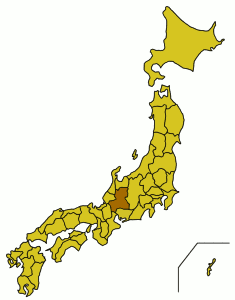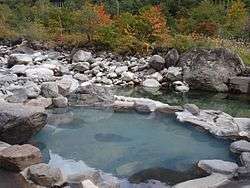Gifu (prefecture)
Gifu Prefecture (岐阜県 Gifu-ken; ) is a region in the central Chubu region of the main Japanese island Honshu.

Understand
The self-proclaimed "Heart of Japan", the prefecture was once two separate provinces; Hida Province in the north and Mino Province in the south. The defining feature of Hida Province is the northern stretch of the Japan Alps, making it a prime destination for three popular Japanese pastimes: hiking, skiing and hot springs. The elevation of the western mountains combined with its shared weather patterns with the coastal Hokuriku Region means the area gets a lot of snow in the wintertime. While snow can make things difficult for residents, it is quite appealing to those in Kansai and the Tokai region where snow is rare.
The former Mino Province in the southern part of the prefecture is home to many former castles and historic sites. The Nakasendo trail cuts through the entire region from on its way from Nagano to Shiga, leaving many preserved buildings and historic sites scattered around the former post towns.
Cities
- 🌍 Gifu — the eponymous capital of the prefecture
- 🌍 Hida — Famous for its festivals and the historical district around the Seto River
- 🌍 Mino — Hosts an annual Japanese paper lantern festival and contest in early October
- 🌍 Ogaki
- 🌍 Seki — Known for its traditional iron smithery, including an annual sword-making demonstration and sales of high-quality domestic-use knives
- 🌍 Tajimi
- 🌍 Takayama — the castle town and major transport hub of the beautiful northern Hida (飛騨) region, with an excellent museum and some well-preserved houses from the Edo period.
- 🌍 Tarui
- 🌍 Toki
- 🌍 Yoro — small town with a park which houses Site of Reversible Destiny with its sloped surfaces and utterly bizarre design intended to disorient visitors
Other attractions

- Gero Onsen — one of the most famous hot spring towns in Japan
- Hakusan National Park
- Oku-Hida Onsen Villages — a string of tiny hot spring villages nestled deep in the mountains
- Sekigahara — site of an epic battle that ushered in the Tokugawa Shogunate
- Shirakawa-go — famed for its traditional gasshō-zukuri houses
- Gujo
- Ibigawa
- Motosu
- Kakamigahara
- Ena
- Nakatsugawa
- Kaizu
- Hashima
Get in
By plane
The Meitetsu Line connects Gifu to Chubu Centrair International Airport up to 2 times per hour. The one-hour ride costs ¥1310.
By train
The JR Tokaido Main Line runs through Gifu on its way from Nagoya to Kyoto and Osaka. The Tokaido Shinkansen also makes a solitary stop at Hashima in the southern part of the prefecture.
From Tokyo Station, the best way to reach central Gifu is to take a Tokaido Shinkansen train (Nozomi or Hikari) to Nagoya, then change to a Tokaido Line local train for the run to Gifu. (2 1/4 hours total; ¥11190 via Nozomi, ¥10990 via Hikari).
The same connection can be made coming from Kyoto and Osaka in Kansai, and from other stations on the shinkansen network to the west.
Four shinkansen trains generally stop every hour, two in each direction, at the Gifu-Hashima station: the slow Kodama train which makes all stops on the shinkansen route between Osaka and Tokyo, and a Hikari which makes all stops between Osaka, Kyoto and Nagoya, then runs directly to Tokyo.
There is no charge to use the Hikari or Kodama trains with the Japan Rail Pass.
By car
The central Chūō Expressway, which largely follows the alignment of the Tokaido Line, also passes through southern Gifu.
Get around
See
- Pay homage to Oda Nobunaga's treasured Gifu Castle (Gifu)
- Stroll the historic streets and try Hida beef in Takayama
- Relive history by retracing the steps of the armies that fought in the Battle of Sekigahara (Sekigahara)
- Traverse the Nakasendo Post Town of Magome and walk part the popular route to Tsumago or onward through Gifu Prefecture (Nakatsukawa)
- Hike to Yoro Falls (Yoro)
- Wander about the old enclave of preserved farmhouses that are now World Heritage Sites (Shirakawa-go)
- Explore the historic ruins of Iwamura Castle and the remains of the castle town below (Ena)
- Learn about the history and development of Seki swords (Seki)
- Reflect on the journey of the Saigoku Kannon Temple Pilgrimage at Kegonji, the final temple (Ibigawa)
- Touch the days of yore with a walk through the old udatsu town (Mino)
Do
Buy
Eat
Gifu's best-known speciality is hōba miso (ほうば味噌), a version of the ubiquitous Japanese bean paste grilled on a hōba leaf and served as a dip or for eating with rice as is. Sounds pretty simple, but the taste is exquisite.
Gifu is located about as far from the sea as physically possible in Japan, so this is one place where seafood is not prized. Instead, Gifu is known for Hida beef, thickly marbled with fat and very expensive. Products grown in the surrounding mountains are also famous, particularly persimmons, chestnuts and mushrooms. A popular souvenir is kurikinton (栗きんとん), a candy made by steaming and mashing chestnuts with sugar and reconstituting the mass into a chestnut shape.
Drink
There are a number of excellent small sake breweries in Gifu. Look out for the tiny Niki Shuzō (二木酒造; ) brewery's brands, including Tamanoi (玉の井) and Himuro (氷室).